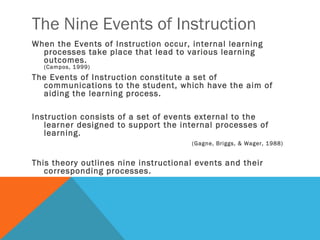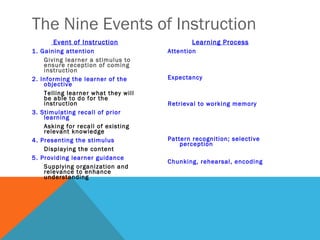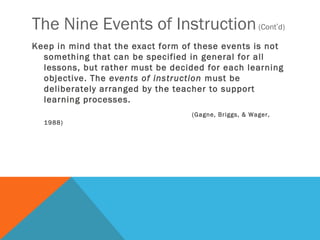Robert Gagne developed nine events of instruction based on his theory of conditions of learning. The nine events are gaining attention, informing learners of objectives, stimulating recall of prior learning, presenting the stimulus, providing guidance, eliciting performance, providing feedback, assessing performance, and enhancing retention and transfer. When these events occur in instruction, they support various internal learning processes that lead to different learning outcomes. The events are not prescriptive but must be deliberately designed for each learning objective.


![Gagne’s Theoretical Orientation
Gagne’s instructional theory tends to side with behavioristic
principles (teacher-centered approach) because he
focuses on outcomes/behaviors that result from
instruction. Further, he believes that the results of
learning are measurable through testing, and that drill,
practice, and immediate feedback are effective.
Gagne’s theories became influenced by cognitive theorists.
He proposed that the information-processing model of
learning could be combined with behaviorist concepts to
provide a more complete view of learning tasks (Molenda,
2002):
Gagne (1997): “These [cognitive] theories propose that stimulation
encountered by the learner is transformed or processed in a
number of ways (i.e., through commitment to short-term memory,
conversion to long-term memory, and the retention and retrieval of
that information) by internal structures during the period in which the
changes identified as learning takes place. ”
( Campos, 1999)](https://image.slidesharecdn.com/gagnesnineeventsofinstruction-130212225617-phpapp01/85/Gagnes-nine-events_of_instruction-3-320.jpg)









